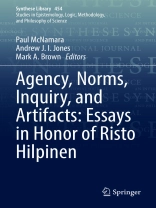The book contains a collection of chapters written by experts from the fields of philosophy, law, logic, computer science and artificial intelligence who pay tribute to Professor Risto Hilpinen’s impressive work on the logic of induction, on deontic logic and epistemology, and on philosophy of science.
In addition to an introduction by the editors, a section on Professor Hilpinen’s positions, professional services and honors, as well as a complete bibliography of his writings, the editors, Mc Namara, Jones and Brown, have compiled a multidisciplinary global cross-section of academic contemporaries that provides insights and perspectives on Hilpinen’s influence and legacy.
The essays reflect central aspects of Risto Hilpinen’s research interests, and offer further contributions to some of the philosophical fields for which he is best known: applied modal logic, including deontic logic (from the ancient Greek δέον déon, pertaining to the concepts of duty and obligation), the semantics of normative language, the logic of action, and the theory of practical reasoning; the analysis of the concept of artifact; and the theory of semiotics in the tradition of Charles Peirce. The presence in the collection of several papers relating to deontic logic underlines Hilpinen’s importance in that area, in which his publications have long been recognized as standard works. The book is an essential collection of ideas for all those who feel at home in a variety of formal disciplines, from propositional logic to the logic of artificial intelligence.
Inhaltsverzeichnis
Editors’ Introduction.- Part I. Branching Time, Causation, and Agency. 1. Time and Actual Obligations (Mark A. Brown).- 2. Actual Cause and Chancy Causation in ‘Stit’: a Preliminary Account (Marek Sergot).- Part II. The Nature of Norms & Obligations. 3. Deontic Logic and the Propositional Nature of Norms (Pablo E. Navarro, Jorge L. Rodríguez).- 4. Imperative Foundations for the Metaphysics of Obligation (Peter B. M. Vranas).- Part III. Varieties and Applications of Normative Logic. 5. The Logic of “Must” and “Have to” (Sven Ove Hansson).- 6 On the Role of Normative Modalities in the Characterization of Emotions (Andrew J I Jones).- 7. A Natural Conditionalization of the DWE Framework (Paul Mc Namara).- Part IV. History of Deontic Logic. 8. Ibn Ḥazm on Heteronomous Imperatives. A Landmark in the History of the Logical Analysis of Norms (Shahid Rahman, Farid Zidani, Walter Edward Young).- Part V. Inquiry and Inference. 9. Hilpinen’s Theory of Inquiry (Erik J. Olsson).- 10. Practical Inferences (Hille Paakkunainen).- Part VI. Artifacts. 11. Artwork Authorship As a Sign-in-action (Joao Queiroz and Pedro Atã).- 12. The Primacy of Abstract Artifacts (Maria Elisabeth Reicher).- About Risto Hilpinen.
Über den Autor
Paul Mc Namara concentrates his research in ethical theory, deontic logic, and the philosophy of moral language. He is best known for his work in deontic logic—having authored (or co-authored) monograph-length overviews of deontic logic (in the
Stanford Encyclopedia of Philosophy, in the
Handbook of the History of Logic, vol. 7:
Logic and the Modalities in the Twentieth Century, and in the
Handbook of Deontic Logic and Normative Systems, Vol. 1). He is also well-known for a number of philosophical and logical articles where he identifies schemes that make room for supererogation and other often neglected concepts of common sense morality, a topic for which he is currently completing an invited monograph-length chapter for the second volume of the
Handbook of Deontic Logic and Normative Systems. He was a keynote for DEON 2014, and for
Trends in Logic XVII, 2017
. He was a fellow at the Institute of Philosophy, School of Advanced Studies, University of London in 2005-2006, and he oversees the
Northern New England Philosophical Association, and serves on the steering committees for the
DEON conference series, and for the
Formal Ethics conference series.
Andrew J. I. Jones has published research in a broad range of areas in applied logic and theoretical AI, including deontic logic, AI and Law, the formal analysis of communicative acts, the logic of self-deception, and the logical characterization of the emotions. With José Carmo he wrote a chapter on contrary-to-duty obligations that appeared in volume 8 of the second edition of the
Handbook of Philosophical Logic (2002), and with Davide Grossi he wrote the chapter on constitutive norms and counts-as conditionals in the
Handbook of Deontic Logic and Normative Systems, Vol. 1 (2013). He was a founding executive co-editor of the
Journal of Applied Logic, and a member of the editorialboard of
Artificial Intelligence & Law. He served on the program committees for several of the DEON conferences, was PC co-chair of DEON 2002, and invited speaker at DEON 1996. He was elected Fellow of the Norwegian Academy of Science and Letters in 1999.
Mark Brown focuses his research on philosophically applied logic, with special emphasis on deontic logic, the logic of action and ability, the logic of time, and the connections among these areas. He has also done extensive research on generalized quantifiers. He has served on the Program Committee for all but three of the biennial series of DEON conferences, which started in 1991, coedited (with José Carmo) the DEON ’96 volume “Deontic Logic, Agency and Normative Systems”, and was an invited Speaker for DEON ‘2004. He was also keynote speaker for the 1993 meeting of the Society for Exact Philosophy. He is past President of the Creighton Club (the New York State Philosophical Association).












